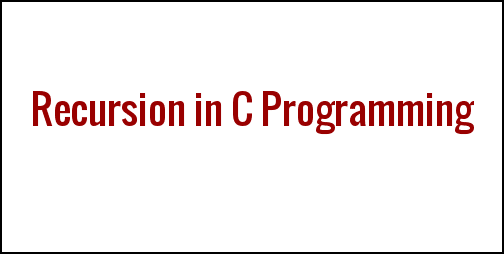Recursion in C
When function calling itself is called recursion in c programming language. In other words, When function is call in the same function is known as recursion in c language.
The function which calls the same function is called recursive function in C.
Recursive functions is quite useful in any mathematical calculation for solving a problem e.g useful in calculate factorial of any number, perform fibonacci series, etc.
After explaining recursion in c, Let's see the syntax of recursion in c.
Syntax:
function()
{
function();//calling itself, known as recursion or recursive function
}
Let's talk about some advantages and disadvantages of recursion in c language.
The function which calls the same function is called recursive function in C.
Recursive functions is quite useful in any mathematical calculation for solving a problem e.g useful in calculate factorial of any number, perform fibonacci series, etc.
After explaining recursion in c, Let's see the syntax of recursion in c.
Syntax:
function()
{
function();//calling itself, known as recursion or recursive function
}
Let's talk about some advantages and disadvantages of recursion in c language.
Advantages of Recursion in C
There are some advantages of using recursion in c language.
- Recursion will be useful when same kind of work has to be continued for a finite no input or time.
- We can reduce the length of the code by using recursion in c.
- Recursion is very useful for solving data structure problems.
Disadvantages of Recursion in C
There are some disadvantages of recursion in c language.
- It requires more memory because recursive calls along with automatic variables are stored on the stack.
- Recursive solution is always logical and it is very difficult to trace i.e debug and analyse.
Now let's explain recursion in c with examples.
Factorial using recursion in c
This is the simple factorial program with recursion in c language.
#include<stdio.h>
#include<conio.h>
int fact(int);
void main()
{
int number, a;
clrscr();
printf("Enter number");
scanf("%d", &number);
a = fact(number);
printf("Factorial is %d\n", a);
getch();
}
int fact(int x)
{
int f;
if(x ==1)
return 1;
else
f = x*fact(x - 1);//recursion performed
return f;
}
}
Output: Enter number 5
Factorial is 120
Output: Enter number 5
Factorial is 120
Fibonacci Series Program in C with Recursion
This is simple fibonacci series program in c by using recursion function.
#include<stdio.h>
int fibonacci(int);
main()
{
int n, c, i = 0;
scanf("%d", &n);
printf("febonacci series \n");
for(c = 1; c <= n; c++)
{
printf("%d\n", febonacci(i));
i++;
}
return 0;
}
int febonacci(int n)
{
if(n == 0)
return 0;
else if(n == 1)
return 1;
else
return (febonacci(n-1) + febonacci(n-2));
}
Here we discussed what is recursion in c language with examples and their advantages and disadvantages.
Check other C tutorial articles e.g data types in c language and printf() and scanf() function in c.
Check other C tutorial articles e.g data types in c language and printf() and scanf() function in c.









0 comments:
Post a Comment